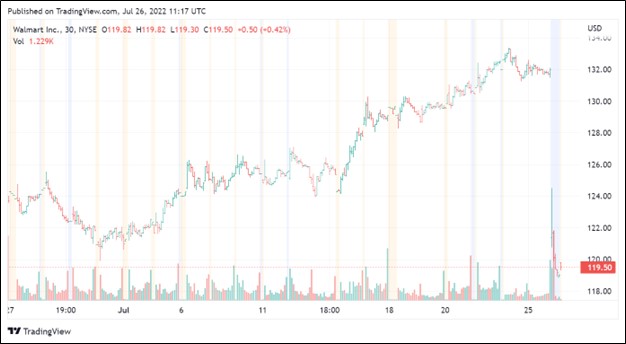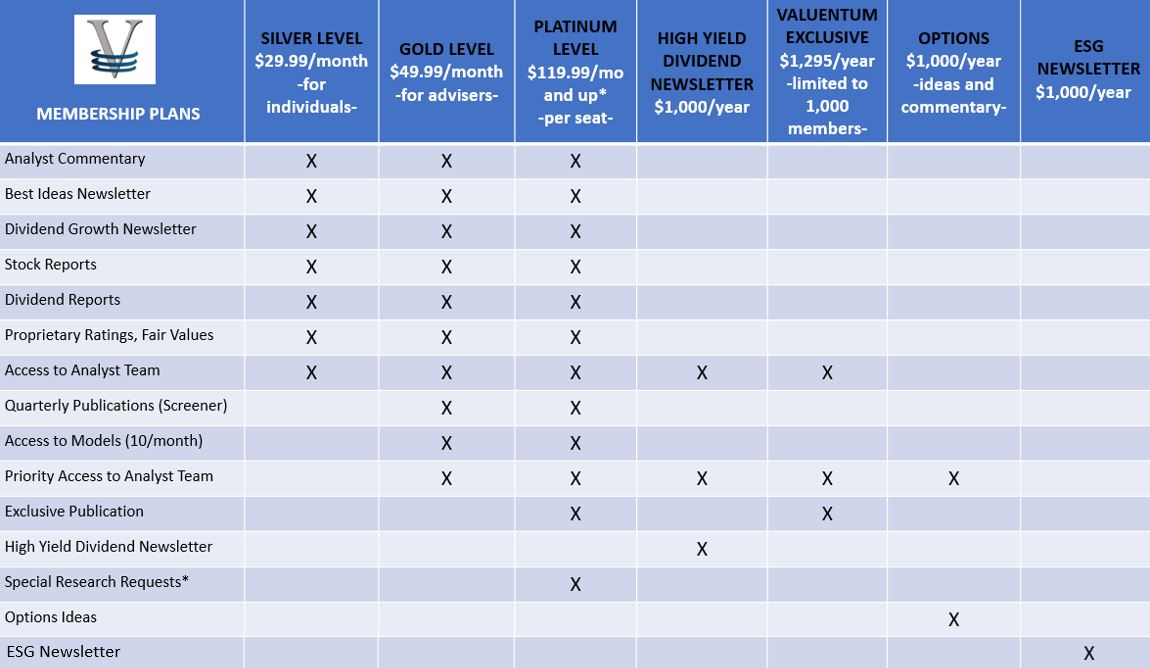|
|
Walmart’s Business Update Likely Means U.S. Is In Recession, But Near-Term Weakness Is Already Baked Into Stock Market
publication date: Jul 27, 2022
 Image Shown: Shares of Walmart Inc dropped sharply during afterhours trading on July 25 as the retailer sharply cut its adjusted operating income and EPS guidance for the current fiscal year as inflationary pressures are taking a sizable toll on its bottom-line. Image Shown: Shares of Walmart Inc dropped sharply during afterhours trading on July 25 as the retailer sharply cut its adjusted operating income and EPS guidance for the current fiscal year as inflationary pressures are taking a sizable toll on its bottom-line. On July 25, Walmart Inc issued a business update that saw the retailer sharply cut its adjusted operating income and EPS guidance for fiscal 2023 (period ended January 2023), while boosting its consolidated net sales guidance. The company also adjusted its guidance for the fiscal second quarter. Shares of WMT plummeted during afterhours trading on July 25 as investors began to price in concerns over the retailer’s deteriorating margins. We anticipated ongoing weakness in Walmart’s business. On July 4, we released an audio report, “Nelson: I Have Been Wrong About the Prospect of Near-Term Inflationary-Driven Earnings Tailwinds,” highlighting our growing concerns about consumer-tied entities in the consumer staples and consumer discretionary spaces. We continue to expect troubles at the big box retailers and across the apparel space, more generally. Here’s what Nelson had to say in early July that remains applicable today: "I simply was not expecting the magnitude of such operating-income drops across consumer-tied companies, and while I think long-term inflation will eventually help drive higher nominal earnings in the longer run when conditions reach “normalization” again, the lag will be much longer than I originally thought. The numbers out of Walmart, Target, and Nike, for example, speak not only to tremendous earnings weakness, but also to the prospect of economic recession in the U.S." A recession in the U.S. is no reason for panic, however. For starters, we believe most of the fundamental weakness across retail is baked into the stock market, but more generally, investors should not worry about recessionary trends. But why? Well, implicitly embedded within a fair value estimate of a company are expectations of a “normal” economic cycle, complete with peak and trough, with the fair value estimate driven largely by mid-cycle expectations that feed into later stages of the model. The prospects for an unexpected recession in economic activity in the near term shouldn’t cause much of a change in the fair value estimate of a company either, given not only that a recession is already implicitly embedded in the fair value estimate, as noted, but also that near-term expectations don’t account for nearly as large of a contribution to the fair value estimate as long-term normalized expectations within the valuation construct. Most of a company’s intrinsic value is driven by its performance beyond year 5 in our model, or on a mid-cycle, going-concern basis. A company’s fair value estimate range (margin of safety) also captures various scenarios regarding economic activity, including a bull and bear case. With that said, recessionary tendencies may cause pricing impacts in the market in the event that consumers/investors use the stock market as a source of income by selling stocks, causing pressure on share prices, but the discounted cash flow (DCF) model already bakes in economic cyclicality and inevitable recessions, if not directly, then implicitly by targeting long-term mid-cycle expectations and via the application of the fair value estimate range. That’s why it’s great to be a long-term investor, scooping shares up when others are forced to sell in the near term, while holding them over long periods, letting compounding work its magic.
Subscribe Now to Gain Access!
This page is available to subscribers only. To gain access to members only content (including this research piece), click here to subscribe. With a subscription, you'll have access to all of our premium commentary, equity reports, dividend reports and Best Ideas Newsletter and Dividend Growth Newsletter, as well as receive discounts on all of our modeling tools and products. Financial advisers and institutional investors have even more to choose from!

Click to Learn More about Valuentum
If you are already a subscriber, please login.
If you believe you should be able to view this area then please contact us and we will try to rectify this issue as soon as possible.
To gain access to the members only content, click here to subscribe. You will be given immediate access to premium content on the site.
|


